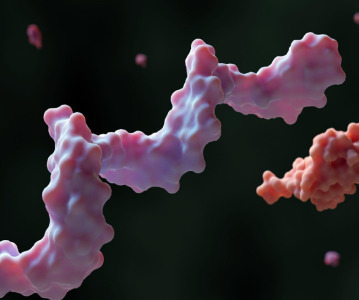Chemotherapy as a tablet instead of an intravenous infusion

New production method for solid dispersions of docetaxel and paclitaxel.
On 29 March 2017, Dutch pharmacist Emilia Sawicki will be defending her doctoral thesis in which she describes how some anticancer medicines can be formulated in such a way that patients take chemotherapy orally as a tablet, rather than as an intravenous infusion at the hospital. One of the anticancer medicines for which she developed a tablet formulation is the widely used drug docetaxel. The formulation is a tablet which is made as a ‘solid dispersion’, and was co-developed by Sawicki at the Slotervaart Medical Centre and the Netherlands Cancer Institute – Antoni van Leeuwenhoek Hospital in Amsterdam. The discovery has already progressed to an advanced stage in the clinical development: shortly, a clinical trial will be opened at several Dutch hospitals where patients with prostate cancer will be treated with the solid dispersion tablet of docetaxel.
Anticancer medicines are increasingly being used as capsules or tablets. Oral medicines are more patient-friendly than the traditional way of administration the chemotherapy as an intravenous infusion. Patients can take the medicine at home as a tablet and no longer have to travel to a hospital to receive chemotherapy. One of the requirements is that the anticancer medicine dissolves in water in order to be effectively taken up in the blood. Dissolution is better if a ‘solid dispersion’ is used: a mixture of tiny particles of powdered medication, which dissolve faster and better in water than larger particles, such as crystalline powders.
In her doctoral thesis ‘Solid dispersions in oncology: a solution to solubility-limited oral drug absorption’, Sawicki describes a new production method for solid dispersions of docetaxel and paclitaxel, two anticancer medicines that are often prescribed to patients with prostate cancer, breast cancer and lung cancer. For example, docetaxel is prescribed approximately 24,000 times a year to cancer patients in the Netherlands. As a solid form docetaxel and paclitaxel are not well absorbed in the blood. This is because they are very poorly soluble in water and because they are broken down by enzymes in the gastrointestinal tract and liver. The solid dispersion method increases the dissolution of docetaxel and paclitaxel 40 to 100 times and when co-administered with enzyme inhibitor ritonavir these anticancer medicines are then effectively absorbed in the blood. As a result, many patients experience a highly promising anticancer effect.
Moreover, the production method for the solid dispersion tablet of docetaxel is suitable to supply the medicine on a large scale and this makes it possible to conduct large clinical trials. Amsterdam-based biopharmaceutical company Modra Pharmaceuticals is launching shortly several clinical trials with the solid dispersion tablet of docetaxel.
In addition, Sawicki also used the solid dispersion technique to develop a tablet formulation of elacridar, a medicine predominantly used in studies focusing on brain tumours, since elacridar promotes the absorption of other anticancer medicines in the brain.
Related News
-
News Google-backed start-up raises US$600 million to support AI drug discovery and design
London-based Isomorphic Labs, an AI-driven drug design and development start-up backed by Google’s AI research lab DeepMind, has raised US$600 million in its first external funding round by Thrive Capital. The funding will provide further power t... -
News AstraZeneca to invest US$2.5 billion in Beijing R&D centre
Amid investigations of former AstraZeneca China head Leon Wang in 2024, AstraZeneca have outlined plans to establish its sixth global strategic R&D centre in China. Their aim is to further advance life sciences in China with major research and manufact... -
News Experimental drug for managing aortic valve stenosis shows promise
The new small molecule drug ataciguat is garnering attention for its potential to manage aortic valve stenosis, which may prevent the need for surgery and significantly improve patient experience. -
News How GLP-1 agonists are reshaping drug delivery innovations
GLP-1 agonist drug products like Ozempic, Wegovy, and Mounjaro have taken the healthcare industry by storm in recent years. Originally conceived as treatment for Type 2 diabetes, the weight-loss effects of these products have taken on unprecedented int... -
News A Day in the Life of a Start-Up Founder and CEO
At CPHI we work to support Start-Up companies in the pharmaceutical industry and recognise the expertise and innovative angles they bring to the field. Through our Start-Up Programme we have gotten to know some of these leaders, and in this Day in the ... -
News Biopharmaceutical manufacturing boost part of new UK government budget
In their national budget announced by the UK Labour Party, biopharmaceutical production and manufacturing are set to receive a significant boost in capital grants through the Life Sciences Innovative Manufacturing Fund (LSIMF). -
News CPHI Podcast Series: The power of proteins in antibody drug development
In the latest episode of the CPHI Podcast Series, Lucy Chard is joined by Thomas Cornell from Abzena to discuss protein engineering for drug design and development. -
News Amgen sues Samsung biologics unit over biosimilar for bone disease
Samsung Bioepis, the biologics unit of Samsung, has been issued a lawsuit brought forth by Amgen over proposed biosimilars of Amgen’s bone drugs Prolia and Xgeva.
Recently Visited
Position your company at the heart of the global Pharma industry with a CPHI Online membership
-
Your products and solutions visible to thousands of visitors within the largest Pharma marketplace
-
Generate high-quality, engaged leads for your business, all year round
-
Promote your business as the industry’s thought-leader by hosting your reports, brochures and videos within your profile
-
Your company’s profile boosted at all participating CPHI events
-
An easy-to-use platform with a detailed dashboard showing your leads and performance







.png)